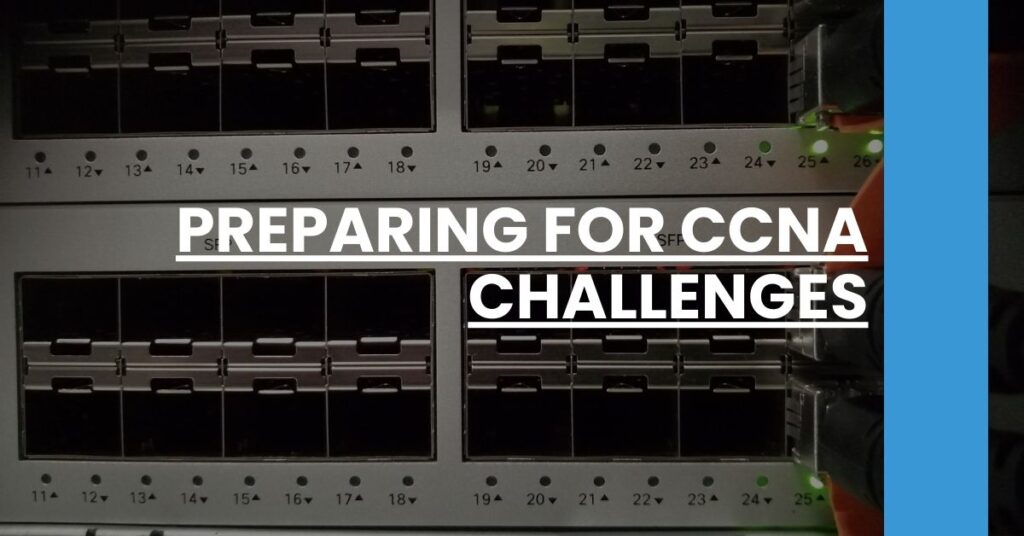The CCNA exam is a rigorous test of networking knowledge, indeed challenging but entirely conquerable with the right approach. Successfully preparing for the CCNA exam hinges on a strategic study plan that comprehensively covers essential networking topics and includes ample hands-on practice.
In “Preparing for CCNA Challenges,” you’ll find pertinent advice on:
- Key topics to focus on for the CCNA exam
- Recommended study materials and practices
- Effective strategies for passing the exam on your first try
Empowering yourself with this guidance can lead to a triumphant CCNA certification journey, bolstering your IT career with recognized technical prowess.
- Understanding the CCNA Certification
- The CCNA Exam Overview
- Key Topics Covered in the CCNA Curriculum
- Preparing for the CCNA: What It Takes
- Difficulty Level of the CCNA Exam
- Comparing CCNA with Other IT Certifications
- Tips and Strategies to Succeed in the CCNA Exam
- The Value of CCNA in Your Career
- Conclusion: Is CCNA Worth the Effort?
Understanding the CCNA Certification
As you forge your path in the IT networking realm, the Cisco Certified Network Associate (CCNA) certification often emerges as an essential milestone. Preparing for the CCNA is like training for a marathon; the journey is rigorous but profoundly rewarding. Grounded in networking fundamentals, this certification is globally acknowledged and sets a benchmark for your expertise in installation, configuration, operation, and troubleshooting of medium-size routed and switched networks.
Why Pursue CCNA?
The pursuit of CCNA speaks volumes about your dedication to networking. A CCNA credential not only paves the way for more advanced certifications but it can also give you a significant edge in a competitive job market. Whether you aim to climb the career ladder or seek a solid foundation in network engineering, the CCNA serves as your launchpad.
A deep dive into the essentials of network security, automation, and programmability awaits you. The CCNA curriculum aligns with the dynamic requirements of modern network environments, making it a strategic ace in your professional deck.
The CCNA Exam Overview
Embarking on the CCNA exam, you’ll navigate through a 120-minute assessment designed to test your knowledge and skills. The exam is a mix of different question formats, including multiple-choice, drag-and-drop, simulation, and testlet.
Exam Structure and Scoring
The CCNA exam adopts a scoring method that remains a bit enigmatic, but one thing’s clear – you must demonstrate a robust understanding of networking principles to pass. Your prowess in addressing various network scenarios through simulations will play a crucial role in your success.
While the passing score is a closely guarded secret, your objective is to master the knowledge, not just play the numbers game. It’s about proving your competence in a field where precision and adaptability are non-negotiable.
Key Topics Covered in the CCNA Curriculum
Your journey to conquering the CCNA will take you through a diverse landscape of technical knowledge. You’ll tackle subjects such as:
- Network Fundamentals: This includes everything from understanding network components and architectures to IP addressing and Ethernet concepts.
- Network Access: You will explore switching technologies and configure VLANs – grasp the backbone of intra-network communications.
- IP Connectivity: Routing protocols and their configuration will be key, ensuring efficient internal and cross-network data transfer.
- IP Services: Diving into services such as DHCP, SNMP, and QoS, you bolster network functionality and performance.
- Security Fundamentals: Here, you reinforce the network’s defenses, learning about security concepts, VPNs, and firewalls.
- Automation and Programmability: In tune with the evolving field, you’ll also touch on network management through automation tools and APIs.
Mastering these areas is not just about passing the test; it’s about equipping yourself with the skills needed to thrive in real-world networking scenarios.
Preparing for the CCNA: What It Takes
Success in the CCNA exam doesn’t happen by chance; it’s the result of deliberate and strategic preparation. You might ponder over the question, “How hard is CCNA?” but the answer lies in your preparation commitment. Here are steps you can follow:
- Identify Reliable Study Materials: The right resources can serve as your roadmap. Cisco offers a slew of official materials that cater to the exam specifics. Consider enrolling in the Cisco Networking Academy or investing in acclaimed guidebooks to fortify your understanding.
- Practical Experience: Supplement your study with hands-on practice. Setting up real equipment or using simulation software like Packet Tracer can engrave the concepts deep into your skill set.
- Practice Tests: Measure your readiness by tackling practice exams. These tests not only gauge your knowledge but also acclimate you to the exam’s timing and complexity.
- Study Groups and Forums: Engage with peers and professionals through platforms such as the Cisco Learning Network. Collective wisdom can provide insights beyond the page, helping you recognize and surmount the nuances of networking principles.
- Manage Your Time: Allocate regular study sessions leading up to the exam. Steady, focused preparation beats a frantic last-minute cram, ensuring you’re well-versed in the essence of the curriculum.
Every step towards CCNA certification hones your capabilities; consider each topic an investment in your professional credibility. The question of “How hard is CCNA?” becomes less daunting once you grasp the level of commitment required. Now, let’s explore the specific challenges of the certification exam itself.
Difficulty Level of the CCNA Exam
When you ask yourself “How hard is CCNA?”, you’re contemplating multiple dimensions of difficulty. The CCNA exam covers a broad spectrum of topics, each demanding a depth of understanding that stretches beyond surface-level knowledge. You’re not just memorizing facts; you’re integrating complex concepts that are crucial for real-life network problem-solving.
Complexity of Topics: The technical subject matter requires you to grapple with intricate details. Topics like network automation, while forward-looking, can be particularly challenging if you don’t have a background in programming.
Breadth of the Syllabus: The CCNA exam is comprehensive. It takes more than a good memory; you must understand how to apply concepts in various scenarios, necessitating a balanced mastery across all areas.
Time Management: During the exam, the clock is your silent adversary. Balancing speed and accuracy is key. You need to be quick enough to answer all questions yet deliberate in your approach to avoid careless mistakes.
Level of Detail: The CCNA demands precision in your responses, especially in simulation and testlet questions, where you’ll need to demonstrate hands-on skills. Fine details can make the difference between a right or wrong answer.
To get an in-depth look at what the CCNA exam entails, including types of questions and preparation tips, visit Cisco’s Exam Information page here.
These factors collectively account for the CCNA’s reputation as a challenging certification. However, with consistent effort and the right resources, passing the CCNA is entirely achievable.
Comparing CCNA with Other IT Certifications
Comparing CCNA to other IT certifications is a bit like comparing different languages; each has its own nuances and areas of focus. For example, CompTIA’s Network+ is often seen as a stepping stone to the CCNA. It covers networking basics and is slightly less in-depth, which can make the CCNA seem more daunting. However, the CCNA dives deeper into Cisco-specific technologies and configurations, arguably making it more specific and hands-on.
On the other hand, certifications like the Security+ from CompTIA, while equally vital, take a broader approach to security without delving deeply into the intricacies of network configurations that the CCNA does.
Remember, the perceived difficulty of any certification can vary based on your existing knowledge and experience in the field. Research the different question types and the content of the CCNA compared to other exams here to get a better understanding of what to expect.
Tips and Strategies to Succeed in the CCNA Exam
As you embark on your CCNA journey, you’ve likely gathered a slew of study tips and exam strategies. Let’s elevate your approach with some targeted insights that can guide you to success.
1. Craft a Study Plan: Tailor your study schedule to the CCNA exam topics. Identify which areas you’re less familiar with and devote extra time to those.
2. Layer Your Learning: Start with overarching concepts and gradually delve deeper into the specifics. This approach helps to build a solid foundation that you can rely on when handling complex questions.
3. Use Various Resources: Blend your study materials—use books, videos, labs, and practice exams to reinforce your knowledge in different ways.
4. Hands-On Practice: Set up a home lab or use simulation tools like Cisco’s Packet Tracer. The tactile experience of configuring networks will cement your understanding far better than theoretical study alone.
5. Join Study Groups: Conversations with peers can shed light on different perspectives and heuristics, which might prove invaluable.
For a more exhaustive guide on conquering the CCNA, you can dive into Simplilearn’s study tips here.
The Value of CCNA in Your Career
Possessing a CCNA certification is akin to holding a key to vast opportunities in the networking field. It validates that you’ve surmounted the challenge of “how hard is CCNA” and emerged with a technical proficiency that employers seek.
Career Impact: CCNA certifies that you are adept in networking, making you attractive to employers and paving the way for job advancement and higher earning potential.
Professional Development: The certification process equips you with practical skills that go beyond the exam, preparing you for complex real-world networking issues.
Global Recognition: As a benchmark for networking knowledge, the CCNA is recognized around the globe, opening international career doors for you.
In terms of return on investment, the time and effort spent in attaining the CCNA certification can translate into a substantial career payoff. To further explore how the CCNA enhances career prospects, consider reading the perspectives from Cisco here.
Conclusion: Is CCNA Worth the Effort?
Arriving at the end of your inquiry into “how hard is CCNA,” it’s clear that while the path is steep, the destination is worth every step. The CCNA certification is a testament to your commitment and expertise in the networking domain.
By balancing the challenge with the extensive preparation you’ve undertaken and considering the professional benefits you stand to gain, the CCNA emerges not just as a formidable challenge, but as a rewarding endeavor that can set the trajectory of your career.
You now have the insights to weigh the sense of accomplishment against the investment of your time and resources. For those dedicated to the field of networking, the answer is often a resounding, “Yes, the CCNA is worth it.” And remember, the journey to certification is as much about building confidence as it is about obtaining a credential.
In short, if you’re prepared to take on the challenge and fully commit to the preparation process, the CCNA certification can serve as a cornerstone for your future in the IT industry.

